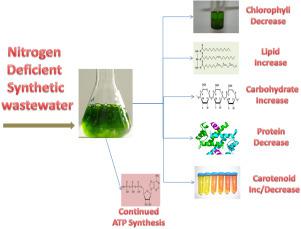Environmental Technology & Innovation ( IF 6.7 ) Pub Date : 2021-04-20 , DOI: 10.1016/j.eti.2021.101572 Senthil Nagappan , Gopalakrishnan Kumar

|
Microalgae are a possible source of biofuel, but no commercial development has yet been developed. Possible approaches to improve economic feasibility involve increasing lipid content and the usage of biorefinery in microalgae. In this regard, the nitrogen-deficient-synthetic wastewater was fed to four microalgae to increase the lipid and carbohydrate content. In conjunction, changes in the amount of biorefinery components, including proteins and pigments, during nitrogen synthetic wastewater feeding have also been reported. The study revealed that both lipids and carbohydrates increased as much as 2 and 1.5 times in selected microalgae after 20 days of nitrogen-deficient-synthetic wastewater relative to nitrogen sufficient conditions, respectively. In particular, after 20 days of exposure to nitrogen deficient synthetic wastewater, the highest Lipid content of 40% was displayed by Desmodesmus sp. The same species had also shown an increased carbohydrate content of 18.3%. Carotenoids was retained in Desmodemsus sp. (0.03%) through nitrogen deficiency, but were shown to be reduced in three other algae. Analysis of the FAME profile of four nitrogen-deficient microalgae indicated that lipid was promising for biodiesel production as it showed an increase in saturated fatty acid content and a decrease in unsaturated fatty acid content. However, during nitrogen insufficiency, unavoidable side reactions involving reductions in protein levels, chlorophylls (a and b type) and biomass were observed in all four microalgae. But 23.3% protein was found in Desmodesmus sp. at end of 20 day of nitrogen deprivation The study showed that feeding of nitrogen-deficient-synthetic wastewater raised the lipid and carbohydrate content and maintained carotenoids in selected microalgae. Above said approach is possibly a low cost economical option for biorefinery.
中文翻译:

氮不足的合成废水中用于生物精炼厂生产生物燃料的四种微藻的研究
微藻是生物燃料的可能来源,但尚未开发商业开发。改善经济可行性的可能方法包括增加脂质含量和微藻中生物精炼的使用。在这方面,将氮不足的合成废水加入到四个微藻中,以增加脂质和碳水化合物的含量。同时,也报道了氮合成废水进料过程中生物精炼成分(包括蛋白质和色素)数量的变化。研究表明,相对于充氮条件,缺氮合成废水处理20天后,所选微藻中的脂质和碳水化合物分别增加了2倍和1.5倍。特别是在暴露于氮缺乏的合成废水中20天后,Desmodesmus sp。同一物种的碳水化合物含量也增加了18.3%。类胡萝卜素保留在Desmodemsus sp中。(0.03%)通过缺氮引起,但在其他三种藻类中却减少了。对四种缺氮微藻的FAME谱分析表明,脂质具有生产生物柴油的潜力,因为它显示出饱和脂肪酸含量的增加和不饱和脂肪酸含量的减少。然而,在氮不足的情况下,在所有四个微藻中均观察到不可避免的副反应,涉及蛋白质水平,叶绿素(a和b型)和生物量的降低。但是在Desmodesmus sp中发现了23.3%的蛋白质。20岁末缺氮日研究表明,饲喂缺氮合成废水可提高所选微藻中的脂质和碳水化合物含量,并维持类胡萝卜素。以上所述方法可能是生物精炼厂的低成本经济选择。











































 京公网安备 11010802027423号
京公网安备 11010802027423号